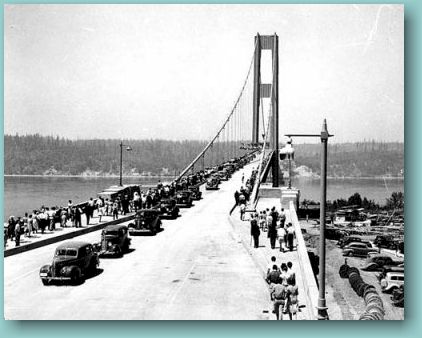Introduction (original) (raw)
Exhibit: History of the Tacoma Narrows Bridge
The following images and text detail the story of the Tacoma Narrows Bridge from the inception to the reopening of a reconstructed bridge in 1950. Links to further pages on the Construction, Opening, Collapse, Aftermath, and Reconstruction are available at the bottom of the page. Text sources are listed in the bibliography at the end of the Reconstruction section. Image sources are described in the captions accompanying the images. The images are the exclusive right of the cited institutions (the University of Washington Libraries, Special Collections and the Museum of History and Industry), please contact them for reproduction permission.
Tacoma Narrows Bridge shortly after collapse showing approach and bridge tower with hanging bridge deck, November 7, 1940.
James Bashford Press Photos. PH Coll. 290.51 University of Washington Libraries. Special Collections.
For additional images and documents relating to the history of the Tacoma Narrows Bridge, see the Tacoma Narrows Bridge Collection on the UW Libraries Digital Collections website.
The original Tacoma Narrows Bridge was built between November 1938 and July 1, 1940. Lauded as an essential economic and military portal to the Olympic peninsula, its completion was called a triumph of man’s ingenuity and perseverance. Four months after it opened to the public it fell, in what was later called “the Pearl Harbor of engineering.”
The storm cable assembly and catwalks are shown during the construction of the Tacoma Narrows Bridge, January 10, 1940.
PH Coll. 11.19 University of Washington Libraries. Special Collections, University Archives.
Contemporary accounts appeared to be shocked by the collapse although the bridge began exhibiting wavelike motions during the final stages of construction. Soon after its official opening the bridge gained a reputation for this movement and became informally christened ‘Galloping Gertie.’ Professor F.B. Farquharson, an engineering professor at the University of Washington, and other University engineers were hired to suggest methods to reduce the movement on the bridge. Over the next few months experiments were conducted on a scale model but a solution to the problem proved elusive.
Opening day of the Tacoma Narrows Bridge, July 1, 1940.
PH Coll. 290.25 University of Washington Libraries. Special Collections, University Archives.
On November 7, 1940 Professor Farquharson was there to witness and document the spectacular collapse of what had been the third longest suspension bridge in the world with the longest single span in the country. In the aftermath many theories were discussed concerning the cause of the bridge’s collapse. Ultimately an investigative board for the Washington State Toll Bridge Authority announced the failure was due to the bridge’s design reacting to the wind in the Narrows
Bridge midsection crashing into the waters of the Tacoma Narrows, November 7, 1940.
Bashford and Thompson Photo. PH Coll. 290.36 University of Washington Libraries. Special Collections, University Archives.
Although rebuilding the bridge was immediately suggested, investigations on the wreckage found that the entire superstructure to be unusable. The onset of World War II further stalled attempts to rebuild. Salvage activity continued on the bridge through 1942 with the materials going to the U.S. war effort and the profits saved for the construction of a new bridge.
Broken wires on the Tacoma Narrows Bridge, November 16, 1940.
James Bashford Press Photos. PH Coll. 290.59 University of Washington Libraries. Special Collections.
While the salvage work went on Professor Farquharson was commissioned to test models of the old Narrows Bridge and the new proposed design for the bridge. At the University of Washington’s new structural research lab, built specifically to house the models, tests proved that the new design was sound. Construction on the new bridge began in the summer of 1948 and was finished in October 1950. The previous three and a half years spent studying aerodynamics insured a bridge that would not mimic the first, the Tacoma Narrows Bridge has remained standing.
Souvenir booklet commemorating the opening of the second Tacoma Narrows Bridge.
Accession Name: UW Engineering Experiment Station Records (71-3) Box 17 Folder 26 Misc.
Photographs, etc. University of Washington Libraries. Special Collections, University Archives.
Continue to next section, “Construction“





